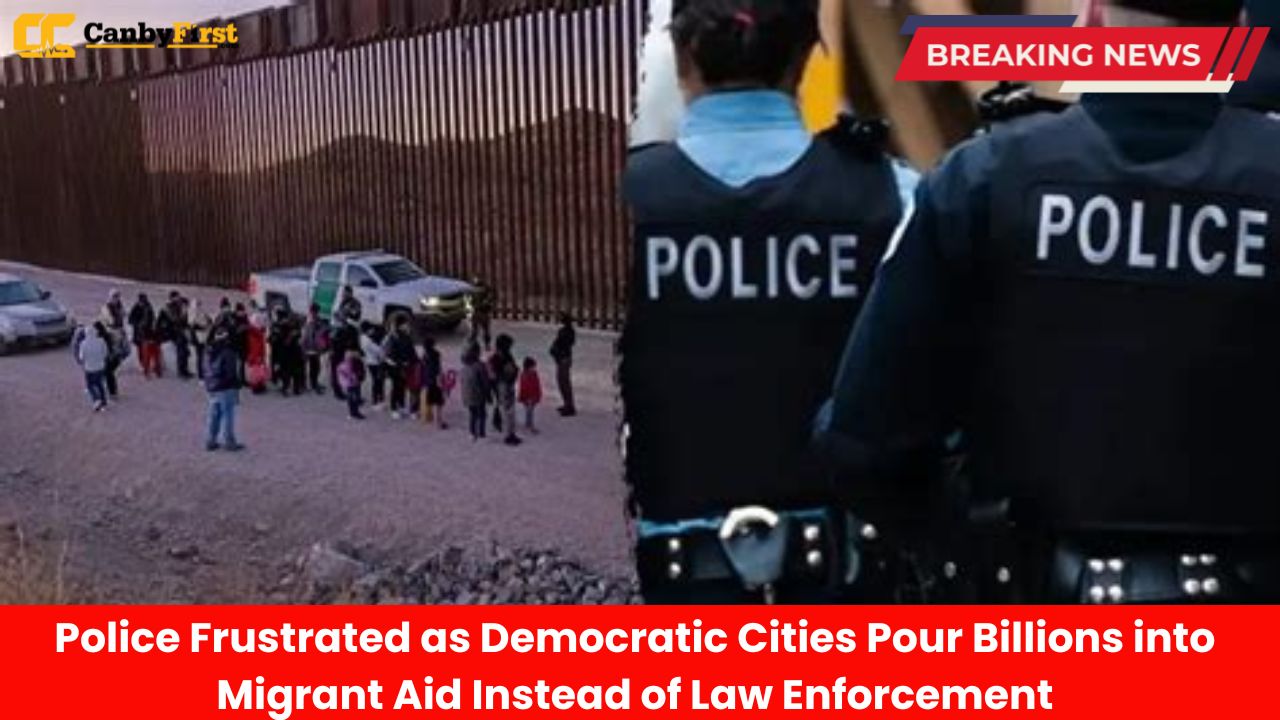Washington, US: Tension is rising between law enforcement agencies and Democratic-led city administrations as police groups voice frustration over the growing diversion of funds from public safety to migrant assistance programs. Several officers and union representatives say they are “tired” of watching billions channeled into initiatives that fail to support local communities or officers risking their lives on the streets.
Police Unions Express Growing Discontent
Across many major cities, including New York, Chicago, and Los Angeles, police associations have spoken out about budget reallocations that prioritize migrant shelter, healthcare, and support services over essential law enforcement needs. Officials say the result has been strained departments, unfilled vacancies, and a drop in morale among officers.
A national law enforcement group representing thousands of officers stated that members feel abandoned and underappreciated, as city leaders continue funneling billions into what they describe as temporary “crisis management” for illegal aliens instead of ensuring public safety.
Also Read
Strained Budgets and Officer Shortages
In cities already facing significant financial shortfalls, the redistribution of resources has put pressure on fundamental services. Some departments have been forced to freeze hiring or delay equipment upgrades due to budget constraints, even as crime rates remain a persistent concern.
A police spokesperson in New York described a troubling situation where the city’s budget for migrant housing dwarfs the planned budget increase for public safety. Officers argue that this growing imbalance endangers residents and erodes community confidence.
City Leaders Defend Spending Priorities
Democratic city officials maintain that their migrant spending is necessary to handle a humanitarian crisis, insisting that federal policies have left local governments to manage an unprecedented influx of migrants on their own. They argue that refusing aid could create greater instability and public disorder, which would further burden police forces.
Some leaders also assert that investing in community and migrant programs indirectly improves safety by addressing underlying social issues. However, police advocates counter that these arguments overlook immediate security risks and deteriorating working conditions for officers.
Escalating Political Divide
The dispute highlights a deepening political rift between local governments and law enforcement groups. Police leaders allege that ideological priorities are overtaking practical governance, leading to shortages in personnel and equipment while city shelters and aid centers continue to expand.
Conservative lawmakers have amplified the issue, calling for federal reviews of city spending practices and urging that public safety be placed above what they term “politically motivated social programs.” Meanwhile, progressive officials are pushing back, accusing critics of scapegoating migrants and ignoring broader systemic issues.
Officers Say Public Safety Is at Risk
For officers on the ground, the debate has real consequences. Many report longer response times, heavier workloads, and declining morale as departments struggle with limited staffing. Patrol units in some urban areas are stretched thin, particularly in districts dealing with rising thefts, drug crimes, and public disturbances.
Veteran officers argue that consistent underfunding is leading to burnout and attrition, as younger recruits reconsider long-term careers in policing. They warn that if current trends continue, cities could face a serious law enforcement crisis within just a few years.
Calls for Federal Intervention
The growing frustration has prompted calls for federal intervention. Several national police organizations are urging Congress and the White House to reassess how federal aid and state allocations are distributed, demanding that more funds be directed toward supporting police infrastructure, training, and compensation.
Proponents of this view argue that maintaining law and order must take precedence, especially as cities grapple with both internal unrest and humanitarian challenges. They insist that without strong law enforcement, all other social programs become harder to sustain or protect.
Balancing Compassion and Security
At the heart of the debate lies a difficult question: how can cities balance compassion for migrants with the responsibility to maintain public safety? Advocates for police funding stress that helping one group should not come at the expense of another. They insist that an overemphasis on large-scale migrant aid threatens to destabilize communities and discourage those sworn to protect them.
City officials, however, continue to emphasize shared responsibility, arguing that the federal government must do more to support both local policing and migrant care systems. They point out that police budgets still represent a major portion of city spending, though officers counter that these funds are increasingly stretched thin.
Growing Public Concern
Residents in several urban centers have started voicing concerns about safety and questioning how taxpayer money is being spent. Neighborhood groups report frustration with delayed emergency responses and frequent property crimes that go unresolved due to staff shortages.
Public opinion now appears divided. Some citizens support migrant relief efforts, citing compassion and shared humanity, while others sympathize with police departments calling for renewed funding and recognition.
A Widening Policy Gap
Policy experts suggest that the ongoing dispute reflects a larger shift in priorities within Democratic-led cities. While progressives focus on social reform and equitable inclusion, law enforcement organizations remain committed to traditional public safety goals. Bridging this gap could require new bipartisan strategies that neither alienate officers nor neglect migrants in need.
Until such consensus is reached, the standoff between police and city leadership is likely to intensify, shaping both urban governance and national politics in the months ahead.
Conclusion
The clash between law enforcement and Democratic city administrations signals a growing divide over financial priorities and policy direction. With police unions demanding renewed investment in public safety and city leaders defending their humanitarian commitments, the debate underscores the challenge of governing amid economic strain and social change. Both sides agree on one thing America’s cities are at a crossroads, and the choices made today will define their safety and stability for years to come.












